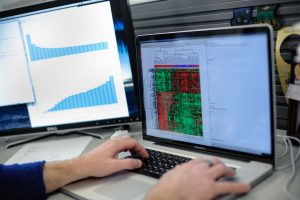

Computational Biology
Computational biology – also known as bioinformatics – is an interdisciplinary field that involves the use of computational technology to gather, store, analyze and integrate biological and genetic information. HudsonAlpha computational biologists perform deep computational analysis and interpret vast amounts of data, a critical role in the science of genomics.
Since bioinformatics is the science of collecting and analyzing complex biological data and genetic code, the field includes of a wide variety of scientists at HudsonAlpha, including biologists, software developers, clinical analysts and geneticists.
In every HudsonAlpha lab, scientists specializing in bioinformatics develop and use analytical and theoretical methods, mathematical modeling and computer simulation techniques to study biological systems and enable the incremental analysis required to process the large amount of data generated in a high throughput laboratory.
In particular, the Software Development & Informatics Team at HudsonAlpha has created a new clinical software tool for the interpretation of whole genome sequencing data. This technology can identify mutations that are responsible for rare and common disease, help patients end their diagnostic odyssey and avoid misdiagnosis, predict the likelihood of future disease development, and help identify which drugs will work best for individual patients.
The new challenge lies in processing the wealth of data into information that can be applied in the development of new diagnostics, treatments, medicines, materials or processes that improve life.
HudsonAlpha’s computational biologists and the bioinformatics team aim to extract biological signal — that is, useful information about how cells, tissues, and organs develop and function — from the million points of genomic data generated by HudsonAlpha’s high-throughput sequencers every day. The team works creatively and collaboratively to fortify scientific research with value-adding analysis and interpretation. By continuously developing new and novel analysis techniques, they are able to return data with rigorous quality control in a form and that has the greatest value to the scientists.
HudsonAlpha currently processes more than 15.6 TB of raw sequencer data through our data pipelines each month. The exome, ChIP-seq, RNA-seq, whole genome, and methylation (methyl-seq) data that passes through the pipelines requires a constant commitment to better hardware and better software. We currently have more than 2 PB of storage and 650 cores dedicated to sequencing and analysis.
